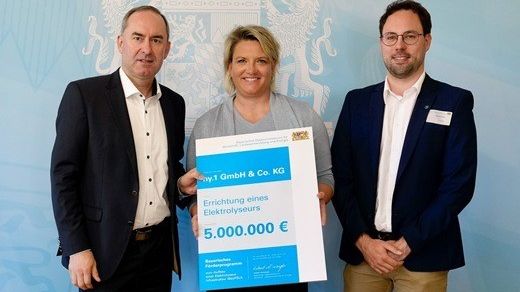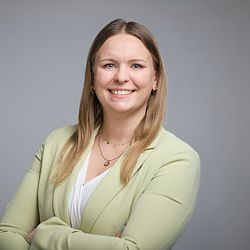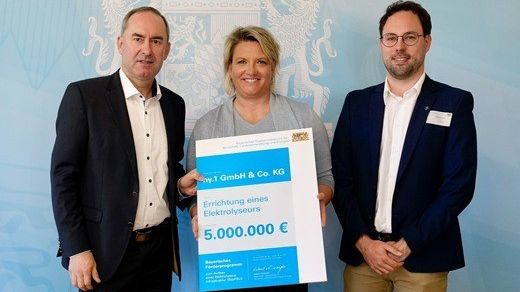
News -
GP Joule Hydrogen Project Receives Funding
The project of the integrated energy supplier GP Joule to produce green hydrogen in Gersthofen has received funding from the Free State of Bavaria: Hubert Aiwanger, Minister of State for Economic Affairs, Regional Development and Energy, presented the funding certificate in Munich on Monday. This is the starting signal for "HY.Gersthofen" and the clean and reliable supply of green hydrogen to industry and SMEs in the Augsburg region.
Government funding and private sector involvement
GP JOULE has been developing the "HY.Gersthofen" concept as the sole shareholder since the beginning of 2023 and has been in intensive discussions with the city, the Gersthofen building authority, the Augsburg district office, various component and electricity suppliers as well as the responsible grid operator and potential customers.
“Green hydrogen is an essential building block for a completely sustainable energy system and for a secure, domestic supply. The funding from the Bavarian State Ministry of Economic Affairs, Regional Development and Energy is confirmation for everyone involved that the efforts to pursue this path are worthwhile,” says Patrick Horst, Project Manager at GP JOULE HYDROGEN: ”Companies from the region that would like to participate in the implementation are cordially invited to get in touch with us.”
The site in Gersthofen even offers the possibility of expanding the plant's electrolysis capacity to 15 megawatts at a later date and supplying even more customers with green hydrogen.
GP JOULE has also already received a grant of two million euros from the Ministry for a hydrogen filling station in the region.
The project
Companies from Swabia - and beyond, of course - will soon be able to obtain sustainable hydrogen directly from the region. The Bavarian State Ministry of Economic Affairs, Regional Development and Energy is providing five million euros in funding for the establishment of hydrogen production in Gersthofen.
State Minister and Deputy Prime Minister Hubert Aiwanger presented the funding certificate to Gloria Geißler-Brems and Patrick Horst from GP JOULE at his ministry in Munich on Monday.
With the Bavarian electrolyser funding program, the Free State of Bavaria is supporting the development of a renewable hydrogen production infrastructure in order to meet future demand in Bavaria and accelerate the ramp-up of the hydrogen economy.
“With the new electrolysers, we are laying the foundations for a strong domestic hydrogen economy,” emphasized Aiwanger at the presentation of the funding certificates: ”GP JOULE impressively demonstrates how important progress can be made with innovative strength and entrepreneurial drive. GP JOULE intends to make the hydrogen produced available for refueling at its own public hydrogen filling stations funded by the Ministry of Economic Affairs. In addition, the green hydrogen will also be made available to regional industry. The company is thus making a tangible contribution to the decarbonization of our economy. I would like to thank those responsible for the project for their commitment.”
Gersthofen is part of the Augsburg metropolitan region and has good access to renewable energies, strong demand for green hydrogen and will soon also have its own local heating network. Ideal conditions for the project.
Hydrogen production and waste heat utilization
The planned 10-megawatt electrolysis plant is expected to be able to produce 900 tons of green hydrogen per year from 2027. That's enough to fuel around 30,000 trucks or produce 15,000 tons of green steel. The plant will be fed with green electricity from solar and wind power, including from the Via Claudia solar park in Gersthofen. The plant also generates around 10,000 megawatt hours of waste heat, which corresponds to the annual heating requirements of 600 single-family homes. This is also to be used: The town of Gersthofen plans to fully integrate and purchase the waste heat generated into the new municipal heating plan.
Thanks to this innovative sector coupling, the electricity required will be used extremely efficiently, saving up to 10,000 tons of CO2 annually.
“If we want to offer affordable energy and reduce CO2 emissions, we need to combine the electricity, heating, industry and mobility sectors, which have long been considered separately,” says Heinrich Gärtner, CTO and co-founder of GP JOULE: ”We need to store and convert the initial energy - electricity from wind and solar power plants - and make it available for flexible use. We want to show how this works in Gersthofen.”

